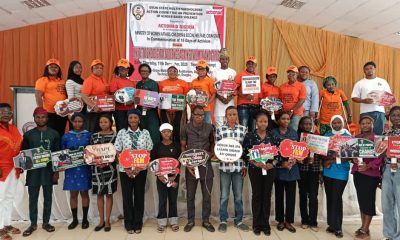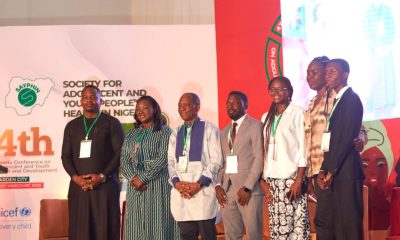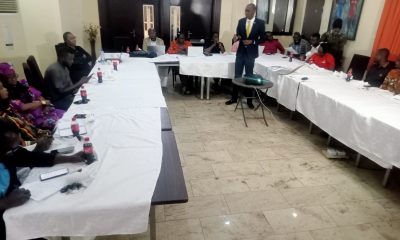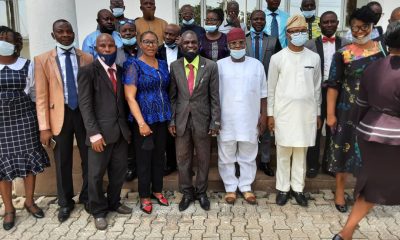News
Experts Advocate Gender Inclusion In Infrastructure Delivery Domain
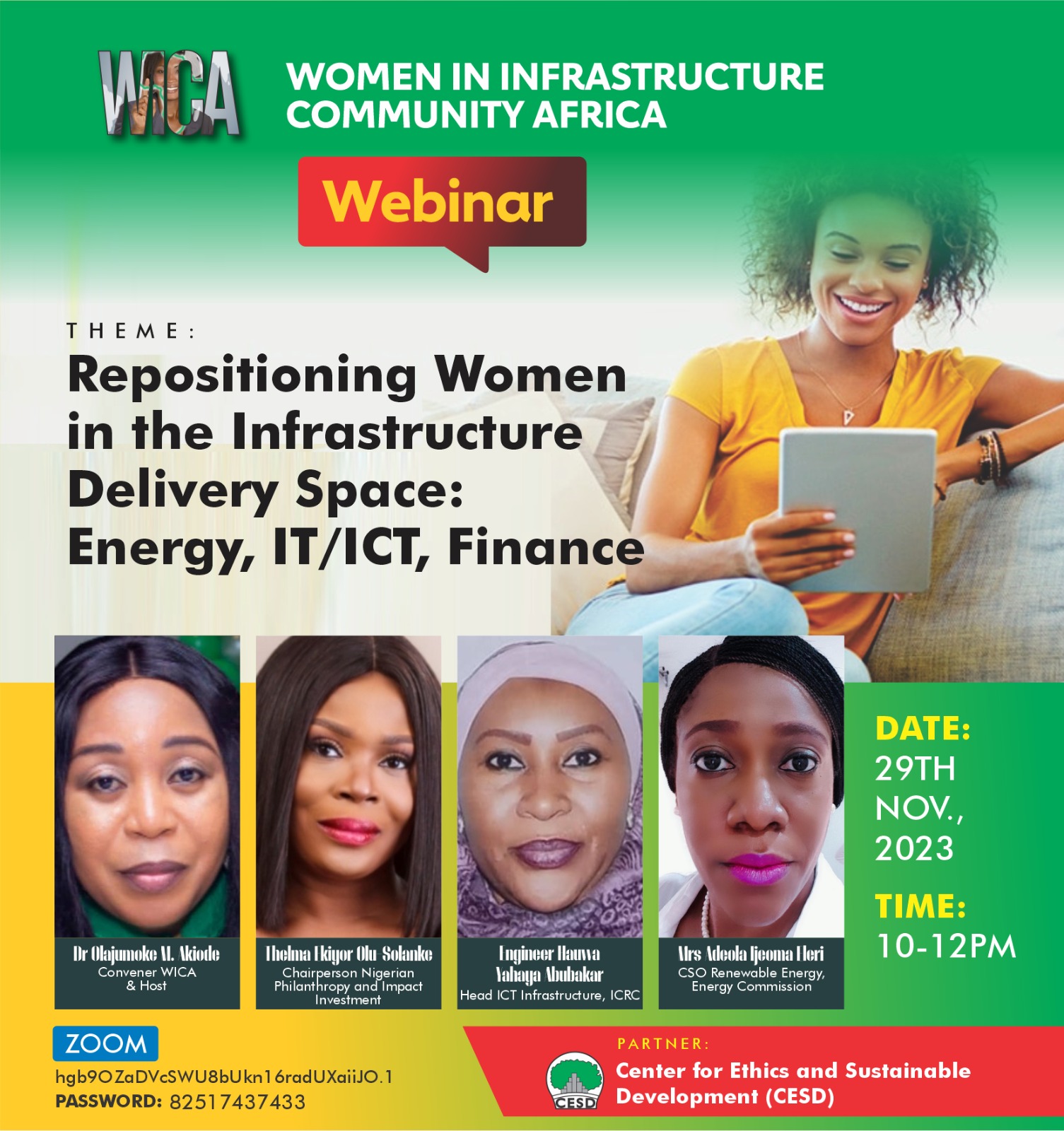
Frontline professionals under the aegis of Women in Infrastructure Community Africa (WICA) have identified persistent cultural norms and institutional biases as hurdles limiting women’s progress in the energy infrastructure space and called for increased gender inclusion in the infrastructure delivery domain.
This was contained in a communique signed and forwarded to pressmen in Osogbo, Osun State by the convener of the group, Dr Olajumole Akiode as part of the highlights of a webinar themed, “Repositioning Women in the Infrastructure Delivery Space: Energy, IT/ICT and Finance”.
WICA, in the statement, observed that women now make up 33% of the workforce all over the world, with 15% in management roles and 11% in scientific and technical roles, adding that “advocacy for gender equality in hiring, promotions, and project allocations ensures that talent is recognized and utilized without bias.”
In her presentation, the chairperson of Nigeria Philanthropy and Impact Investment, Mrs. Thelma Olu-Solanke emphasized the relevance of
Gender Lens in Finance and Empowering Women in Renewable Energy.
She revealed that renewable energy, encompassing technologies like solar energy and hydropower, presents a unique opportunity for women to play pivotal roles and affirmed the need to extend financial support to women in the sector. She added that women should actively participate in shaping the industry, creating products that attract foreign investors, and drive sustainable change. According to her, “One notable challenge hindering women’s involvement is a lack of knowledge in the renewable energy sector”.
Noting that the gap must be closed to ensure broader participation and representation, she further outlined key areas where gender lens funding can yield significant returns in renewable energy which includes investing in the development of technical expertise among women in renewable energy
and providing a comprehensive understanding of how projects can positively influence women on a large scale.
Also speaking, the CSO of Renewable Energy, Energy Commission, Mrs Adeola Ijeoma Eleri shared insights on the need to empower Women in Energy Infrastructure.
According to her, “Globally, women constitute 48% of the workforce, but only 22% in conventional energy. In Nigeria, the figures are 22% in the energy sector workforce and 12% in senior management positions.”
She disclosed that renewable energy is rooted in soft and hard energy aspects and that soft energy involves institutional frameworks and human capital, while hard energy encompasses physical assets like power plants and grids.
She stated that gender diversity in the energy sector has a far-reaching impact, leading to expanded market reach and enriched decision-making processes. She therefore advocated not just for representation but a transformation in the energy infrastructure domain, unlocking the potential of diverse talents and paving the way for an inclusive and innovative future.
Lending her voice to the theme of the event which was well attended by experts and stakeholders and students, the Head of ICT Infrastructure, ICRC Mrs Hauwa Yahaya Abubakar remarked that the gender gap in ICT not only restricts the potential of half the population but also stifles innovation, perpetuating limited perspectives and impeding societal progress.
As a panacea for this, she subsequently recommended, “empowering women through education and skill development” adding that “Initiatives must be in place to encourage STEM education for girls, ensuring they have equal access to opportunities”.
She added that “establishing mentorship and scholarship programmes is essential to guiding and supporting women in ICT. Bridging the ICT gap demands collective efforts” and concluded that “by addressing these key focus areas, we can dismantle the barriers that have constrained women in the ICT sector for too long.”
Dr Akiode in opening the Webinar and welcoming participants, thanked all the sector leaders in WICA, country coordinators and all members of WICA across Africa for keeping the vision alive through the many ways “you push for inclusive infrastructure delivery in Africa. To everyone present at today’s Webinar, I say a heartfelt thank you.”
She added that, “upon reflecting on the year 2023 that is drawing to a close, we felt the need to evaluate our women’s achievements and gains, opportunities missed or lost as well as emerging opportunities, and then realized there is an urgent need for women to be repositioned. That is, women in the infrastructure delivery sector need to upskill, reskill, and acquire basic IT/ICT skills as well as be informed about emerging opportunities in the energy transition space which they can access.”
“This webinar aims to create awareness about the urgent need for personal and professional development, that enhances eligibility for equitable access to the array of opportunities in the energy transition space such as renewable energy, clean cooking, clean and sustainable transportation to mention a few. To challenge us to manage our businesses in ways that make them more efficient and qualified to access grants and funding/investment.”
-

 News4 days ago
News4 days agoI’ll Rather Build Industries Than Build Mega Churches — Prophet Sam Ojo
-

 Entertainment3 days ago
Entertainment3 days agoNigerian Singer, Ifunanaya, Died After Snake Bite In Abuja
-
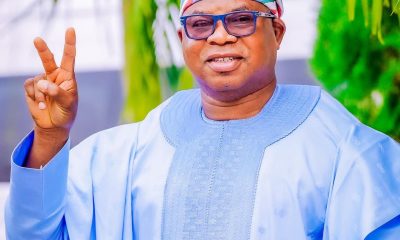
 Opinion4 days ago
Opinion4 days agoBola Oyebamiji: Beyond Skelewu Dancer: The Rising Technocrat Poised To Govern Osun State In 2026 By Wale Atoba
-

 News4 days ago
News4 days ago95-Year-Old Woman Dies As Fire Guts Residential Building In Anambra



